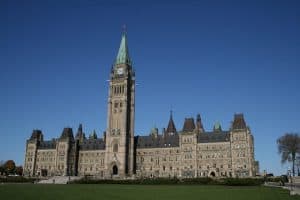[row]
[znhg_column size= »col-sm-6″]
Article Audio:
[/znhg_column][/row]
June 26, 2017 – The federal government is not about to challenge Quebec over its immigration programs, despite British Columbia’s claim its economy is hurt by the French-speaking province’s system.
 The Quebec Immigrant Investor Program (QIIP), currently accepting 1900 new applications in 2017 is the source of B.C.’s frustration, as evidence suggests the vast majority of the mainly-Chinese nationals given visas through the scheme end up settling in the West Coast province.
The Quebec Immigrant Investor Program (QIIP), currently accepting 1900 new applications in 2017 is the source of B.C.’s frustration, as evidence suggests the vast majority of the mainly-Chinese nationals given visas through the scheme end up settling in the West Coast province.
But the former Immigration Minister and current Canadian Ambassador to China John McCallum publicly stated that’s not about to change as it would be against Canada’s constitution to try and make investors settle in a specific province. Once they have permanent residence status, they are free to move to any part of the country. It appears the current Immigration Minister Ahmed Hussen has no plans to challenge Quebec.
Under QIIP, high net worth applicants are given permanent residency in return for an investment of $800,000, provided a number of criteria are met.
QIIP Requirements
- Legally acquired personal net worth of at least $1.6 million;
- Owned and operated a business or held a high-level management position in a private company, government or NGO for two of the previous five years;
- Invest $800,000 in a passive government guaranteed investment for a period of five years and receive no interest. Applicants may finance their investment and liquidate only $180,000 to $220,000 into a government approved financing program for five years and receive no return of capital.
Critics argue that while Quebec benefits from the investment dollars, other provinces like British Columbia and Ontario are left to deal with the impact of wealthy migrants on its economy.
This impact can be both positive and negative, with the wealthy spending more on luxury goods while at the same time using public health and education services and playing a key role in driving up house prices.
The federal government’s inability to act stems from the 1991 Canada-Quebec immigration accord, which sets out terms for the control the province has over its policies.
Justin Trudeau’s Liberals could go some way to resolving the issue by forming a new investment immigration program of its own and reclaim its position as the dominant player in the industry, while at the same time boosting Canada’s struggling economy.
Until 2014, the federal government gave entry-level millionaires a pathway to residency and ultimately, citizenship through its Canada Immigrant Investor Program (CIIP). The scheme operated largely on the interest income earned from investors’ funds. The program benefits to Canada peaked during the 1990s, when interest rates were high.
The program was terminated under much controversy in 2014 by the previous government which, despite compelling favourable studies, claimed it provided no benefit to Canada. It was replaced in February 2015 with an unpopular Immigrant Investors Venture Capital Pilot Program (IIVCP) which McCallum has publicly stated is practically non-existent due to the lack of interest from international investors.
To solve this controversy the Trudeau government should immediately get on with the task of re-designing the IIVCP. It needs to create the right program that will succeed in attracting carefully chosen high net worth business people who will bring billions of dollars to Canadian businesses and create new ventures that will in turn create more jobs.
The benefits of the QIIP residency program to Quebec are undeniable. From 2001-2016, it gave $714 million to 4,737 businesses in 17 territories in the province. A compelling 2010 study conducted by three economists in Ontario and Quebec concluded that an average investor directly injects more than $770,000 into the economy during a five-year investment period.
In Canada, the economic impact of immigration was addressed in a 2016 published study, providing conclusive evidence that immigrants admitted to Canada under all programs are far more likely to start businesses than their Canadian counterparts, a key component for economic growth.
Additionally, a Statistics Canada study highlighted that immigrant children outperform their Canadian counterparts in terms of both high school and university graduation rates. The study found 91.6 per cent of children who arrived in Canada between 1980 and 2000 graduated high school, against 88.8 per cent of their Canadian peers. In terms of university graduation, that gap widened to 35.9 per cent of immigrants versus 24.4 per cent of Canadians.
In view of the overwhelming benefits, Ottawa should also consider establishing a citizenship through investment program for ultra high net worth individuals, and become a dominant Tier 1 country in that field.
Currently Austria, Malta and Cyprus are the only Tier 1 countries offering a direct path to citizenship while Antigua and Barbuda, Dominica, St. Kitts and Nevis and Saint Lucia also offer such programs.
If executed strategically, Canada will also realize significant gains to its human capital in the immediate term and through the children of such business people, in the long term. The human capital benefit that the children of successful business people bring to Canada is immeasurable and invaluable. We already know they do better at both high school and university than their Canadian-born counterparts.
Canada could take the lead on the global stage by creating an international charitable fund for refugees from a portion of the proceeds of investment inflow. In doing so, it would ensure that the world’s wealthiest are directly assisting the world’s immigrant population who are most affected by international conflicts. This is one of the hallmarks of effective immigration policy.
Interested employers: Kindly contact us here to receive further information.
Interested candidates: Find out whether you qualify to Canada by completing our free on-line evaluation. We will provide you with our evaluation within 1-2 business days.
Read more news about Canada Immigration by clicking here.




